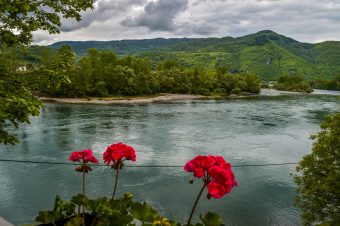
Serbia is the poorest country in the Balkans in autochthonous surface water (runoff module q=5.7 l.s-1.km-2) and is among the most impoverished region in Europe. Neighboring countries have significantly higher runoff module than Serbia, so in Montenegro, it reaches 44, Albania 30, Bosna and Herzegovina 23.4, and North Macedonia 7.8.
In addition to this, we should expect the aggravation of the hydrologic regime in the next few decades because Serbia is situated in the part of southeast Europe, which is hugely affected by ongoing and projected climate change. As such, it is registered on the global level.
Furthermore, surface outflow on the territory of Serbia has prominent spatio-temporal variability, resulting in drinking water shortages in some areas. South, South East, and West parts of Serbia are more affluent in water than Central and East parts. At the same time, the least copious supply is registered at the territory of the Autonomous Province of Vojvodina and confluences of the left tributaries of Kolubara and Velika Morava.
The amount of available water at some territory can be of autochthonous origin (formed from rainfalls and snowfalls in one region) or flows from another area (transient waters). For example, at the territory of the Republic of Serbia, a certain amount of surface outflow is formed. Still, much more significant amounts come from neighboring regions and later flow towards the Black, Aegean, and Adriatic Sea.
The share of transient and other waters is the biggest, which go through the Danube to the Black Sea. The quality of underground waters throughout Serbia is relatively uneven. That happens to be the result of the various mineralogical-petrographical contents of water layers, the genesis of subterranean water and aquifers, waters’ age, different intensity of water exchange, etc.
In focus:
The quality of underground waters ranges from extremely good, which means there is no need for treatment, to the poor, where the complex procedure of water conditioning must be applied before its usage in the public water supply. The status of subterranean waters is determined based on quantity and chemical status The excellent quality of an underground water body is accomplished when the average perennial abstraction of subterranean waters doesn’t exceed the available source of subsurface water and when there is no trend of the level lowering and no risk of pollution from surface waters.
The dominant pressures, considered to cause the poor chemical status of water bodies, include agricultural activities and disorderly sewage systems in populated areas. However, other pressures shouldn’t be disregarded, such as communal and industrial landfills that can cause severe pollution of subterranean waters locally. In general, Serbia isn’t rich in waters. Therefore, only a careful and sensible approach to this resource can satisfy present and future needs.
I want to say something about the ban on the construction of small hydropower plants in the zones of protection of the first, second, and third degree, as stipulated by the new Law on renewable energy resources. No one will be relieved until we see a decisive demonstration of the application of the adopted Law, especially towards those who even now act contrary to Law.
Therefore, the fight against the construction of small hydropower plants with derivation pipelines is going to last. The living world in watercourses has suffered significant damage. The leading causes are the reduction of ichthyofauna (by weight and number), as well as other species, intensification of erosional processes, removal of forest vegetation, disruption between surface and subterranean waters, even due to the endangerment of the system for water supply of some settlements (Vlasotince).

Unfortunately, we haven’t reached the turning point which would allow for the priority of the Law on nature protection over other laws. Also, we aren’t fully aware of the environmental protection imperative, so we hear platitudes being repeated for the sake of appeasement of the public.
An example might be the recently adopted Law on mining and geological research (RS Official Gazette, No 40/2021) that favors mining activities and unconditionally protects the rights and interests of investors while minimizing the importance of applying other laws which are crucial for efficient environmental protection.
Only a sharp penal policy can bring some polluters to senses and control them. Due to the small fines or noncompliance with Law, they keep on with their unacceptable activities. It is necessary to clearly demonstrate the political will for reinforcement of inspection services and prevention of any support that might be given to polluters and investors known for malpractice.
Finally, today citizens are much better informed, environmentally aware, and willing to fight for a healthier environment. They have realized that no one will make an effort unless they make a move and express their will for things to change. Therefore, every regime, the ruling one, and the future will have to act following the demands coming from the voters with a higher sensibility for environmental protection.
The author of the paragraph: Prof. Ratko Ristić, Ph.D. Dean of the Faculty of Forestry at the University of Belgrade
Read the story in the new issue of the Energy portal Magazine WATER RESOURCES.



